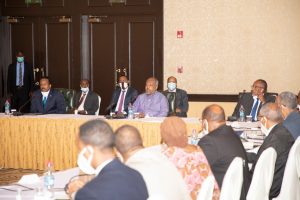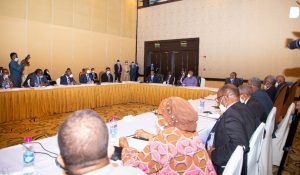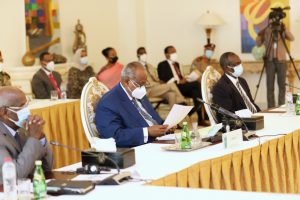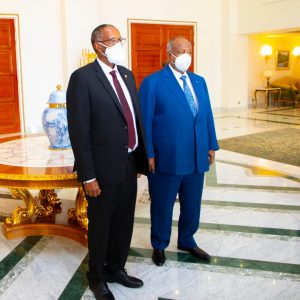The Republic of Somaliland remains committed to a peaceful co-existence with Somalia. However, Somaliland insists in that the dialogue should be a two state process with a substantive agenda that address the core issues of the dispute Bihi Abdi during his opening remarks to the Consultation Summit on Relations between Somaliland and Somalia in Djibouti.
The summit hosted by the president of Djibouti Ismail Omar Guelle has participation that includes a high level Somalia delegation led president Mohamed Abdilahi Farmajo, Ethiopia Prime minister Abiy Ahmed, Representative of the Chairperson of the African Union, Dr. Wrkneh Gebeyehu – The Executive Secretary of IGAD, Donald Yamamoto – The US Ambassador to Somalia and Somaliland, Joseph Silva – The Head of the European Union in Djibouti and Representative of the United Nations as well as numerous ambassadors.
Given the historical and political differences between the two erstwhile partners in the ill-fated union of 1960 and the absence of honouring earlier agreements reached by the two on the past of successive Somalia administrations and preponderantly by the incumbent Farmajo government, bringing the two together was seen as a gargantuan step.
The meeting – to be exact – was convened without a set agenda which the two sides were comfortable with – another handicap to the resumption of the talks.
His Excellency the President of the Republic of Somaliland, in his opening speech, demanded that Somalia first acknowledges the right of the Republic of Somaliland and its people to the restoration of their sovereignty and that, additionally, Somalia officially own up to the genocide meted against the people of Somalia by the Somali-dominated military regime of General Siyad Barre and the incalculable cost in life, anguish and wealth it wasted.
President Bihi reiterated that any resumption of dialogue between his country and Somalia must ‘be a two-state process with a substantive agenda that addresses the core issue of the dispute’.
He. also pointed out that since Somalia did not honour of the earlier agreements reached, Somalia’s sincerity in any future dialogue could not come to fruition. The two sides met in at least seven rounds at London, Dubai, Ankara, Istanbul and Addis Ababa at the end of some which clear, potentially productive agreements were signed.
“Today,” he said, “how can we proceed to this dialogue if the previously signed agreements in London, Istanbul and Djibouti were not implemented yet?”
The matter of a more than 50,000 Somalilanders lost to Somalia-driven ethnic-cleansing, loss of properties worth billions of US Dollars in today’s market values and the tens of thousands of people maimed and displaced. the years lost without schooling to children or health care to civilians were other sore points lumped under ‘Somalia atrocities’ that President did not miss out in his address.
“Words are not enough,” he emphatically stated. “The horror of the past requires more than words. It requires actions.”
President Bihi slammed on the table what he deemed as a possible panacea to heal the widening rift between the two erstwhile partners of the merger.
“The act of recognizing and supporting the independence of Somaliland would go a long way to heal the wounds of the past and enable our two states to embrace each other in our independent but closely interwoven futures,” he said.
Apparently, the points President Bihi presented, apparently were not palatable to the Somalia side, according to the Speaker of the Somaliland Upper House of the Parliament, Suleiman Mohamoud Adam.
Suleiman believed, the same as with a majority of both Somalians and Somalilanders that Farmajo was using the occasion to project to his electorate in the upcoming presidential election in which he was a contending candidate, that he was a politician of clout who single-handedly forced Somaliland back to a negotiating table as an inferior partner.
“Farmajo wants to use these talks as an election wild card, and he is assisted in this endeavour by the US Ambassador and to a significant extent by the Prime Minister of Ethiopia Abiy Ahmed,” he said.
In his speech, Abiy made it clear that reunification was an option he seconded.
Abiy – to his credit or demise – has never concealed his grand ambitions to ‘integrate the region economically and politically’ as he oft-stated at many an occasion in the recent past. He used Farmajo and Afeworki as blind allies who could only see the now and here but not at the horizon Ato Ahmed was envisioning which included finding a corridor to the seas for his 100-million, landlocked people at any cost.
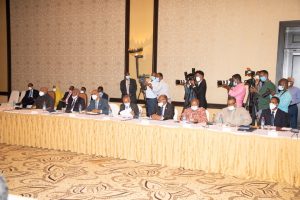
“There was no point in continuing playing the dialogue charade since Somalia was not ready to implement key agreements signed by both parties in more than four previous meetings,” Honourable Suleiman said.
The Speaker stated that it was very likely that the current talks will end without achieving any progress despite the international effort and pressure exerted.
A statement released by the Djibouti Foreign Ministry indirectly supports the pessimistic view of the Speaker by vaguely stating that a ‘technical committee’ formed by the two parties will take it up from other – a euphemism that usually meant that the two sides failed to come to a concrete agreement.
“The President of Somalia and the President of Somaliland came to an understanding that a technical committee comprised of members of the two delegations will resume the talks between the two sides and also follow op (on) pending issues already agreed upon,” the statement said.
On the heels of above, the words ‘the two sides agreed not to politicize development assistance and investment’ came as an afterthought – seemingly.
When nothing was ‘agreed-upon’, such a statement can only be interpreted as a ‘face save’ ploy.
Is spite of the apparent absence of a tangible result, the ministry’s communique shook the flimsy foundations od the Mogadishu adminstration by factually stating that the meetong was between two countries.
Defining the purpose of the meeting, the ministry stated that tit was ‘to help two leaders from Somalia and Somaliland to resume dialogue on the relationship between the two countries’.
Observers in Somaliland point out that, if nothing else, the Djibouti Consultation Summit would prove that the Republic of Somaliland and its hard-earned and regained sovereignty were no pushovers for either Farmajo or his regional and international political supporters to mould to their desired visions.
Whether the talks resume before the Somaliland delegation returns home or not, Somaliland has made its statement clear to the world once more; and it has partially won already by forcing a meeting where there are plenty of regional and international witnesses recording every word, every wince, every scowl.
